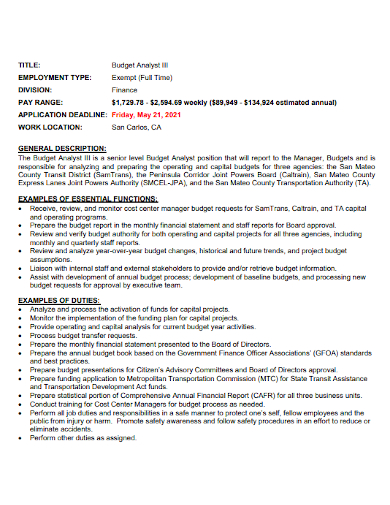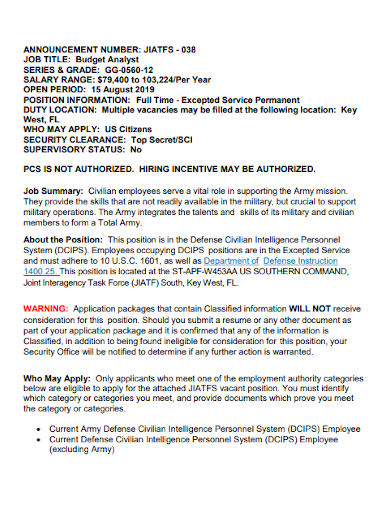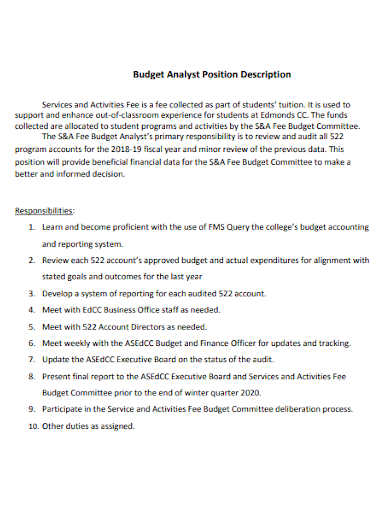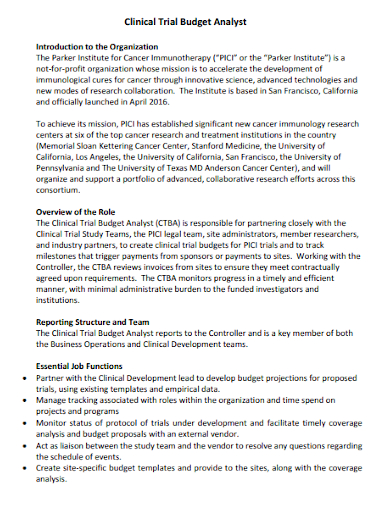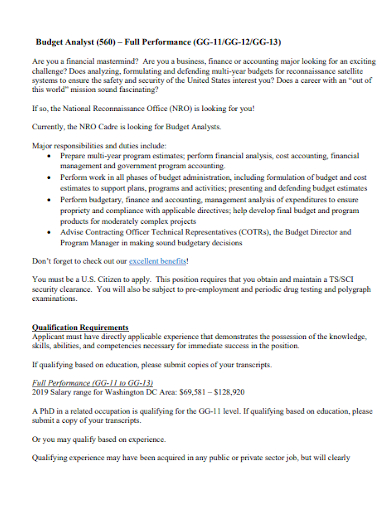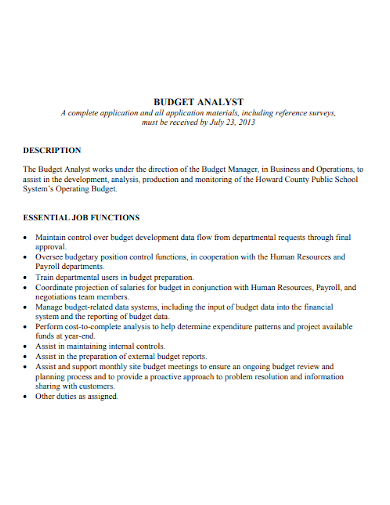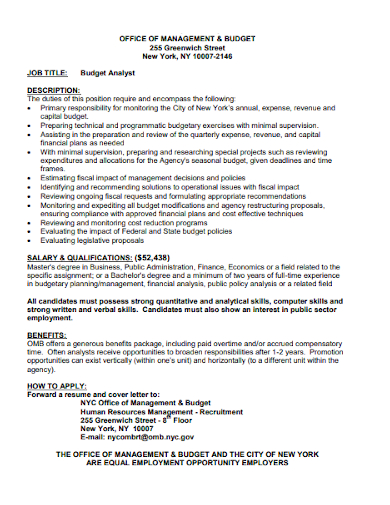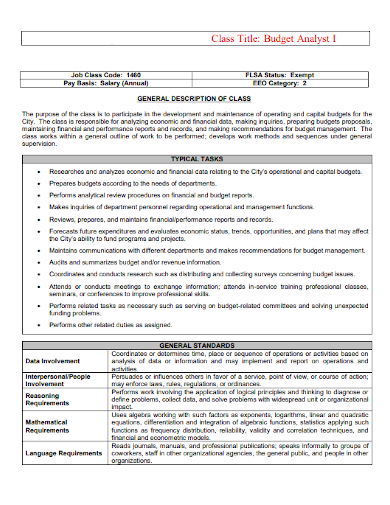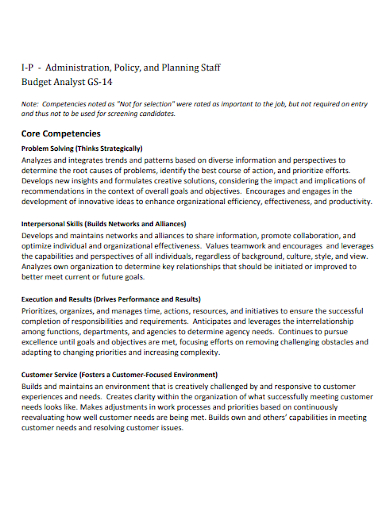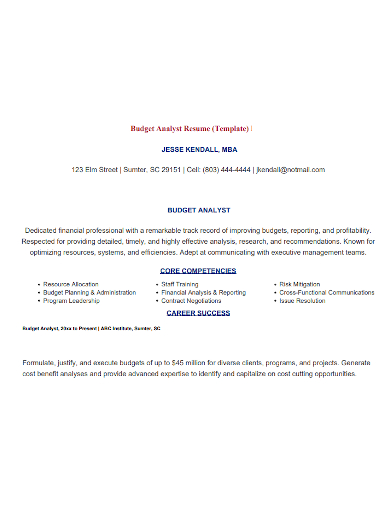Being a budget analyst allows you to work in different sectors of the economy; you can either work for the government or private institutions. Either sector gives you the chance to hone your skills in budgeting and business. If you’re a fresh college graduate who is looking for a job to become a budget analyst, you need to send a resume for every company or agency that has vacant positions for the job you’re looking for. A resume can break or make your chances of getting hired; it is the first thing that the hiring employer will know about you and if your resume is not up to par with their standards, you will sadly then get rejected before you can have an interview with them. This article will guide you on how to create a budget analyst resume.
10+ Budget Analyst Resume Samples
1. Free Budget Analyst Resume Template
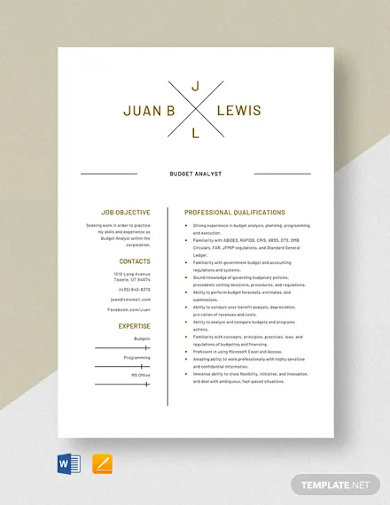
2. Finance Budget Analyst Resume
3. Taskforce Budget Analyst Resume
4. Budget Analyst Position Description Resume
5. Clinical Trial Budget Analyst Resume
6. Budget Analyst full Performance Resume
7. Sample Budget Analyst Resume
8. Management Budget Analyst Resume
9. Printable Budget Analyst Resume
10. Policy and Planning Staf Budget Analyst Resume
11. Editable Budget Analyst Resume
What is a Budget Analyst?
A budget analyst is responsible for advising different organizations, government agencies, private companies, and school institutions about their finances. They usually prepare financial reports, advise on which programs to distribute funds to, and evaluate budget proposals. They could be hired as an employee of an organization or they could be hired as a third-party consultant.
How to Make a Resume
1. Choose the Right Resume Format
When creating a resume, you need to decide which type of format you want to use. Do you want a chronological, functional, or combination type of resume? Decide which is best to list all of your information. You can refer to our sample resume templates above to guide you on which resume using. Make sure to also pay attention to formatting details like font style, font size, margins, and spacing. Make sure to get this right for you to create a professional-looking resume.
2. Write Your Name and Contact Information
Begin your resume with your name, address, and contact information such as your email address and phone number. Your name should be written in a larger font compared to the rest of the document and it should be in boldface.
3. Write Your Objective Statement
The next section to write is your objective statement or a resume summary. The objective statement summarizes your career goals (ideal for fresh graduates to include) while a resume summary describes your work experience and skills.
4. List Your Skills
In this section, list down the skills you have that are in line with being qualified to become a budget analyst. List all technical and interpersonal skills needed for the job as well as putting the license number or certification of obtaining a certain skill related to being a budget analyst.
5. List Your Work Experience
Here is where you list down all the work experience you have that are related to being a budget analyst. Start with the most recent job you had and include the company name, time in which you were employed, your job title, and a few key achievements during your time at the company. If you’re a fresh graduate, include your internship and volunteer work instead.
6. List Your Education Credentials
Don’t forget to include details on where you graduate high school or college, especially if you’re a fresh graduate. Include important details such as your coursework (related to the field of budget analysis), grade point average, organization participation, leadership positions you held (if there are any), and achievements you’ve received. Include the name of the school where you went to, the dates when you were studying there, and the degree of education that you completed in that school.
7. Add More Sections That Describes You Further
If you have more space left in your resume, you can add other sections that tell more about yourself such as your hobbies or interests, other achievements, or you can input a character reference instead.
FAQs
How much do budget analysts get paid?
According to the U.S. Bureau of Labor Statistics, budget analysts have annual salaries of are around $49,000 up to$116,300 depending on where they’re employed, their skillset, and their experience.
What skills do you need to be a budget analyst?
If you want to be a budget analyst, you must have the following qualifications:
- A Bachelor’s or a Master’s degree in finance, accounting, or related field
- Experience in managing budgets for businesses
- Have analytical, mathematical, and problem-solving skills
- Knowledgeable in data analysis and statistical forecasting
What are the responsibilities of a budget analyst?
The budget analyst is responsible to:
- Evaluate budget proposals and funding requests
- Collaborate with project managers to develop a budget
- Doing cost-benefit analysis to determine its value
- Approving or rejecting funding requests
- Determining whether budget proposals comply with law regulations
- Monitor the spending on different projects to make sure it stays within the budget
- Estimate and forecast future financial needs.
Once you’re done writing your resume, review it for any spelling, grammar, and punctuation errors. Ask help from a friend or a family member to review your resume and help you point out which sections you should improve on. Make sure your resume isn’t too long; one page is enough to fill in information about yourself. To help you get started making a resume, download our free sample templates above to use as your guide!
Related Posts
FREE 10+ Annual IT Budget Samples in MS Word | MS Excel | Google Docs | Google Sheets | PDF
FREE 5+ Yearly Budget Planner Samples in PDF | XLS
FREE 10+ Expense Budget Samples in MS Word | Google Docs | Google Sheets | MS Excel | PDF
FREE 4+ Vacation Budget Planner Samples in PDF
FREE 10+ Budget Outline Samples in PDF | MS Word
FREE 10+ Monthly Budget Worksheet Samples in PDF | MS Word | Google Docs | Google Sheets | Excel
FREE 10+ Monthly Project Budget Samples in MS Word | MS Excel | Google Docs | Google Sheets | PDF
FREE 10+ Corporate Budget Samples in MS Word | MS Excel | Google Docs | Google Sheets | PDF
FREE 9+ Primary School Budget Samples in MS Word | Google Docs | Google Sheets | MS Excel | PDF
FREE 10+ Operational Budget Samples in PDF | DOC
FREE 5+ Budget Layout Samples in PDF
FREE 6+ Paycheck Budget Samples in PDF | MS Word
FREE 10+ Architecture Budget Samples in PDF
FREE 10+ Budget Tracker Samples in PDF | DOC
FREE 4+ Corporate Monthly Budget Samples in MS Word | Google Docs | Google Sheets | Excel

